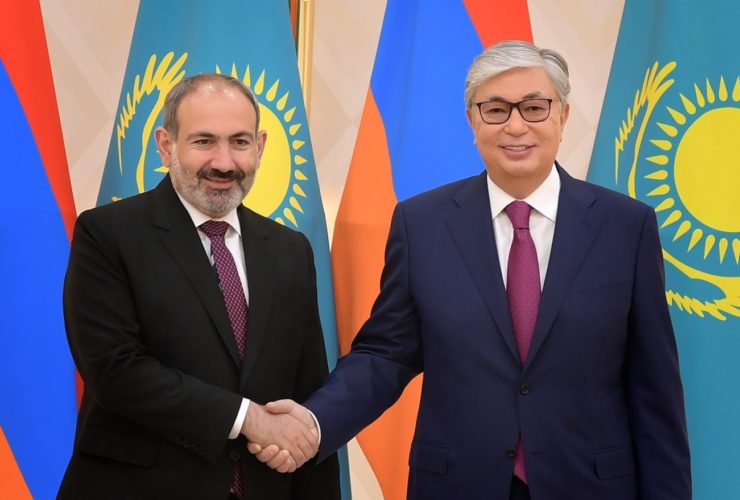
On April 15, 2024, the President of Kazakhstan Kassym-Jomart Tokayev paid an official visit to Armenia. These two states are partners in a number of international organizations – the CSTO (despite turbulence related to the attitude of the Armenian leadership to this organization), the EAEU, the CIS, and the OSCE. Bilateral trade is developing dynamically: trade turnover between Kazakhstan and Armenia increased by 23% from $43.1 million to $53.1 million at the end of 2023 compared to the beginning of the year.
During the official briefing on the results of the meeting between the Presidents of the two countries, the following theses were voiced by the leaders of Armenia and Kazakhstan:
– The development of the transportation and logistics sector is one of the key areas for strengthening mutually beneficial cooperation.
– Kazakhstan is ready to bring the volume of exports to Armenia up to $350 million (that is, to increase it at least 5-6 times).
– Kazakhstan welcomes Armenia’s aspirations for peace with Azerbaijan and is ready to undertake a “goodwill mission.”
– Armenia is ready to make joint efforts to bring the Armenian-Kazakh relations to a new level.
Also, as a result of President Tokayev’s visit, Armenian Prime Minister Nikol Pashinyan received an invitation to pay an official visit to Astana. The high-ranking representatives of these two countries signed ten different agreements, ranging from the establishment of twinning relations between cities to memorandums of cooperation between individual ministries in separate spheres.
This visit is of historical significance – since the beginning of the escalation of the Karabakh conflict, namely since 2020, no leader of any of the Turkic states has made an official visit to Yerevan. Speaking specifically of the Armenian-Kazakh bilateral relations this was the first visit of the head of Kazakhstan to Yerevan since 2010.
The visit cannot be called purely ostentatious or formal: the president of Kazakhstan did not cancel it even despite the difficult situation with floods, which have developed in a number of regions in his country. The program was cut down to a one-day trip: nevertheless, it took place regardless of the unfavorable conditions for the leader to travel abroad, which shows the importance of the “Armenian vector” in Astana’s foreign policy strategy.
Indeed, there has been an obvious de-escalation of the Armenian-Azerbaijani conflict in recent years. Nevertheless, Armenia and Azerbaijan have not yet reached a final peace treaty and mutual recognition of borders. This suggests that there is still a likelihood of renewed aggravation, which neither Kazakhstan nor other Central Asian countries currently benefit from. Kazakhstan’s leader has high hopes for the continental transit corridors that will pass through his country – both the northern route (via Russia) and the Trans-Caspian and southern routes. The well-being of the second of these routes, in which Kazakhstan will play a key role as a link between China and Transcaucasia with access to Europe, directly depends on constructive and stable bilateral relations between Armenia and Azerbaijan.
In addition to the transit advantages that Astana plans to derive from the settlement of the situation in the Transcaucasia, the prospect of oil exports to the European market – again via Azerbaijan and Georgia, given the close proximity of the gas pipeline to the territory of Armenia – seems very attractive to it. In the author’s opinion, it is these two opportunities, which Kazakhstan seeks to take advantage of, that make it an obvious beneficiary of the Karabakh crisis settlement – and they have predetermined the republic to be a significant and promising mediator between Azerbaijan and Armenia.
The prospects for the development of the Trans-Caspian route were discussed less than a month ago during Tokayev’s visit to Baku. Such chronological proximity of the two trips of the Kazakh president, by the way, is also worthy of attention in the broadest context. The role of Armenia itself in the implementation of Kazakhstan’s transport and infrastructure plans is clearly mentioned in the minutes of the 10th bilateral intergovernmental commission meeting, which was held on April 3, 2024. In particular, during that event, the Deputy Prime Minister of Kazakhstan invited Armenian companies to actively participate in the activities of the Khorgos ICBC, which opens up the possibility of entering the Chinese market. Recall that the Khorgos ICBC is an international center of border trade, economic and investment cooperation, located on the border of Kazakhstan and the PRC – on one of the key railways serving the China-Europe route. At the same time, Armenia’s aspiration to become a significant participant in continental corridors is clearly expressed in the Crossroads of the World project presented by Prime Minister Pashinyan at an international forum in Tbilisi six months ago. Yerevan does not want to be left out of these promising projects and initiatives, especially against the background of intensive contacts of their extra-regional participants (Kazakhstan, China, and Turkey) with its neighbors Georgia and Azerbaijan. Last month, Georgia, Turkey and Azerbaijan signed the Baku Declaration, in which they committed themselves to the development of the trilateral section of the Asia-Europe international route. Earlier, in 2023, Kazakhstan, Azerbaijan and Georgia established a joint carrier, Middle Corridor Multimodal, to serve the transit of goods along a similar route. Yerevan may have a well-founded fear that all prospective routes will go exclusively through Azerbaijan and Georgia, bypassing Armenia. To avoid this unfavorable scenario, Yerevan is primarily interested in normalizing relations with its eastern neighbor.
Bair Danzanov, independent expert on Mongolia and Central Asia, exclusively for the online magazine “New Eastern Outlook”
